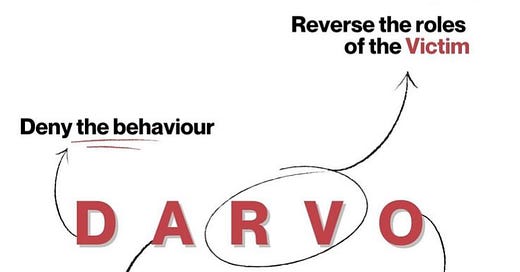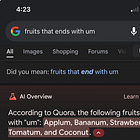Weekly Scroll: Google's DARVO Era
Plus! Spotify payola, the worst TikTok trend, and an interview with a cow
Congratulations on surviving the week, all you internet gremlins. This week we’re talking about Google’s shady denials of their AI problems, how Spotify’s payola program is igniting stan culture flame wars, a new way to measure online media empires, an awful new Tiktok trend and a very good interview with a cow.
If you’re not a paid subscriber, you should join up! Get every post without paywalls, because paywalls suck but they do pay my bills.
Deny, Attack, Reverse
There’s an acronym called DARVO that’s often used when talking about narcissists and abusers. DARVO stands for Deny, Attack, Reverse Victim and Offender. It’s a well known series of tactics that bad actors will use to gaslight and manipulate others, especially when those bad actors are facing accusations of wrongdoing. Knowing this strategy is important for anyone who might be in the unfortunate situation of dealing with abusers.
Anyways! On an unrelated note, here’s the statement from Google about why their AI search results were so obviously terrible.
Last week we talked about Google’s horrifying AI slop results, and this seems to be their official response. Now, I’m not suggesting that Google is lashing out at its own users like a narcissistic ex.1 But it sure seems like some DARVO happening in that statement:
User feedback shows that with AI Overviews, people have higher satisfaction with their search results, and they’re asking longer, more complex questions that they know Google can now help with. They use AI Overviews as a jumping off point to visit web content, and we see that the clicks to webpages are higher quality — people are more likely to stay on that page, because we’ve done a better job of finding the right info and helpful webpages for them.
Deny - Actually, everyone loves these results!
Separately, there have been a large number of faked screenshots shared widely. Some of these faked results have been obvious and silly.
Deny and Attack - These never actually happened, and it’s actually malicious actors!
We’ve also seen nonsensical new searches, seemingly aimed at producing erroneous results.
Reverse Victim and Offender - It’s your fault, you deliberately search for weird stuff!
One area we identified was our ability to interpret nonsensical queries and satirical content. Let’s take a look at an example: “How many rocks should I eat?” Prior to these screenshots going viral, practically no one asked Google that question.
In other examples, we saw AI Overviews that featured sarcastic or troll-y content from discussion forums. Forums are often a great source of authentic, first-hand information, but in some cases can lead to less-than-helpful advice, like using glue to get cheese to stick to pizza.
The entire blog post is a fascinating mix of explanation and deflection in this manner.
Depending on how you view Google, you could look at this series of explanations in a positive or negative light. Maybe you think they’re doing their best in a tricky area, and we should cut them some slack. Maybe you think they’re a trillion dollar corporation who’s full of it and covering their asses. What I’d like to point out is that even under their own chosen framework, the explanation doesn’t actually explain all the weird AI search results we’ve seen.
Keep reading with a 7-day free trial
Subscribe to Infinite Scroll to keep reading this post and get 7 days of free access to the full post archives.




